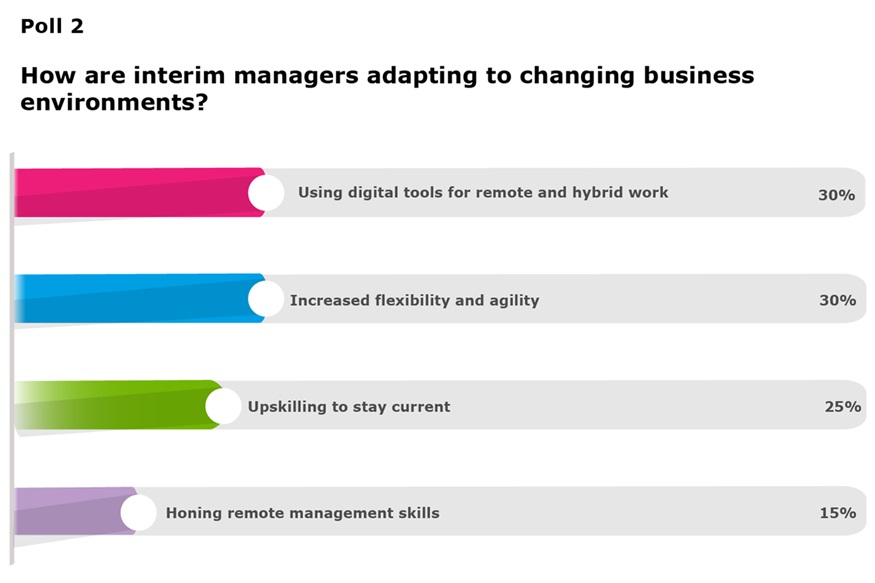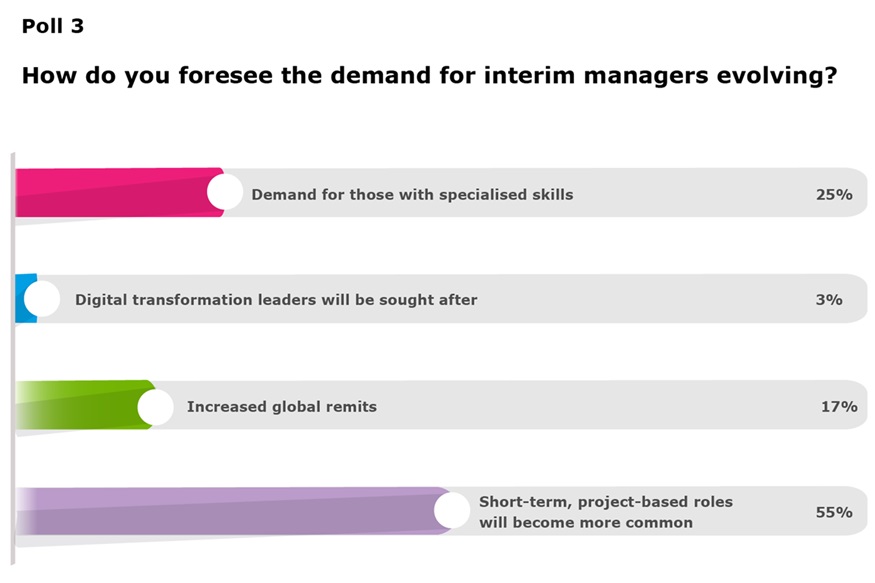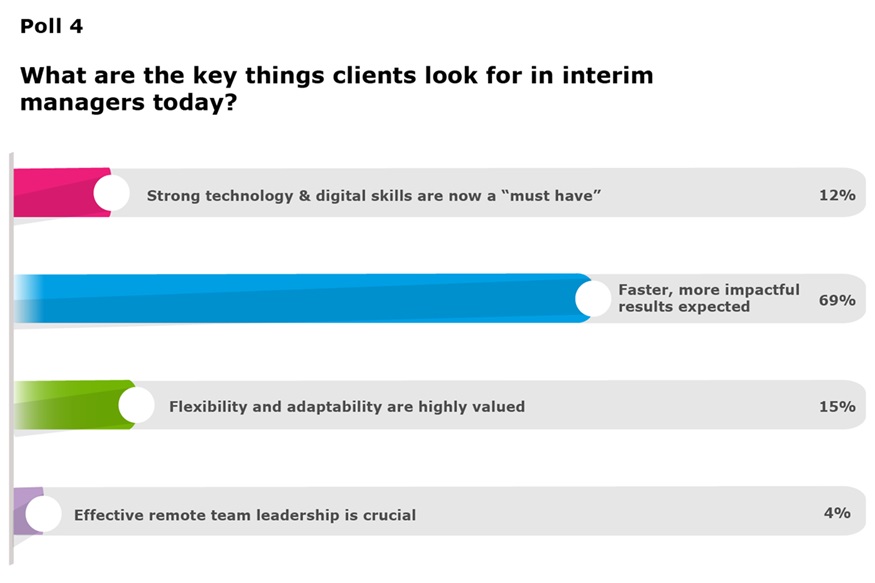Discover the evolving trends in interim management, including the rise in sector-specific expertise, fractional roles, and growing demand for agile, experienced interim leaders.
Evolving Trends in Interim Management
Increased Demand in Key Sectors
The demand for interim managers fluctuates with economic cycles but recent trends show increased demand in sectors like manufacturing, healthcare, and technology. There’s also a growing rise in fractional interim management roles and a focus on sector-specific expertise rather than general interim experience.
Introduction
How Economic Cycles Influence Interim Management Demand
The demand for interim managers remains steady but fluctuates with economic cycles and industry disruptions. During times of economic uncertainty, companies increasingly seek agile interim leaders who can manage change or turnaround situations.
In 2021 and 2022 significant changes took place in the interim management landscape. Despite the global uncertainty caused by the COVID-19 pandemic, business required flexible interim leadership solutions. The need for highly experienced interim managers, particularly at the senior leadership level, was critical to solving business challenges swiftly and delivering impactful results.
Today, clients have heightened expectations from interim managers and demand faster, more impactful results. This underscores the dynamic nature of interim management, where adaptability and a clear return on investment are essential.
Looking ahead, the future of interim leadership roles appears promising. Companies facing ongoing disruptions and uncertainties will increasingly rely on interim leaders who can deliver measurable results quickly. The productivity of the past year has surpassed that of 2023, indicating a positive trend for the interim management demand for sectors like healthcare and manufacturing.
Market Overview
Insights into the Current Interim Management Landscape
During the ‘Boyden Brief’ call, we provided a market update for the interim management community. The first half of the year was busy, and despite the client-focused market, many top interim candidates remained available. Over the late summer, we noticed a significant uptick in demand for interim CFOs, operations leaders, and managing directors’ roles in particular. Increasingly, clients are seeking sector-specific expertise, valuing sector expertise over broader interim expertise from interim leaders in industries like manufacturing and healthcare.
Experienced interim managers who can quickly navigate organisations are highly favored, while executives transitioning between interim and permanent roles face more competition. However, executives entering the interim management sector are finding opportunities through their personal networks.
Key sectors driving demand for interim management include manufacturing, healthcare, energy and technology, which mirrors the focus of many of our search partners. Interim leadership in these sectors is particularly valued for its ability to tackle short-term, project-based roles.
In today’s current buyer's market, interim professionals should focus on building relationships and aligning with contacts who have industry-specific needs. Fractional interim management is growing in popularity, allowing interim managers to handle projects simultaneously, while day rates have remained stable or marginally decreased. Some assignments involve fixed-term contracts (FTC), but compensation generally depends on the critical nature of the role, expected outcomes, and scarce skills.
We’ve also observed a cultural shift towards a more empathetic approach to assignments, where stakeholder management and engagement are key to success.
Poll Results
How Interim Management is Evolving
Faster results now define interim manager expectations

According to 50% of respondents, clients now expect interim managers to deliver faster results, showing how interim leadership must adapt to the demands for quick and impactful outcomes. Businesses are increasingly focused on rapid change and agility in response to fast-paced markets.
32% of respondents stated that interim managers are expected to lead strategically, not just operationally, highlighting the expansion of their role to include long-term business objectives.
A smaller group (11%) highlighted the growing importance of technology integration for interim professionals, while 7% identified the expansion of interim roles into new and emerging industries, such as healthcare and energy.
Adapting to changing business environments through digital tools

A large portion of respondents (30%) indicated that interim managers are adapting to changing business environments by using digital tools for remote and hybrid work, and by becoming more flexible and agile. This trend reflects the growing importance of digital adaptability and proficiency in navigating dynamic work conditions.
Upskilling has also emerged as a key strategy, with 26% of respondents stressing the importance of continuous learning. Meanwhile, only 15% note the need for remote management skills, suggesting that factors like flexibility and proficiency with digital tools are more essential.
Growing demand for project-based interim roles and specialised skills

A majority (55%) believe that short-term, project-based roles will become more common. This indicates a shift towards companies seeking interim professionals who can deliver specific outcomes within a defined timeframe.
24% pointed to the need for professionals with specialised skills in sectors like technology, healthcare, and manufacturing, while 17% noted that interim managers are increasingly being asked to handle global remits, reflecting the global trend of international interim assignments.
Interestingly, only 3% of respondents view digital transformation leadership as a key future trend, suggesting that while digital transformation remains relevant, the focus is shifting toward speed and specialisation.
Speed and impact are top priorities for clients

69% of participants stated that clients prioritise interim managers who can deliver faster, more impactful results. This reflects the increased pressure on interim professionals to produce quick and measurable contributions to their client’s goals.
15% emphasized the value of flexibility and adaptability in today’s interim management landscape, reinforcing the need t for interim professionals to navigate changing environments. Only 4% highlighted the importance of effective remote team leadership, suggesting that remote work is now seen as a given rather than a specialised skill. Additionally, 12% mentioned the importance of strong technology and digital skills in supporting client goals.
Conclusion
The Future of Interim Leadership is Agile, Specialised, and Impactful
Over the past five years, the interim management landscape has transformed significantly. Key trends shaping the future of interim leadership include:
- Flexible Working Arrangements: The rise of fractional interim management allows professionals to engage in multiple projects and offer specialised expertise on a part-time basis.
- Focus on Diverse Leadership: There is an increasing emphasis on inclusive and diverse leadership teams, reflecting broader societal shifts towards equity and representation in the workplace.
- Sustainability Focus: Interim managers are playing a crucial role in driving sustainability initiatives as businesses place greater emphasis on environmentally responsible practices.
These trends have heightened the competition in the interim management market, with a greater focus on capabilities, flexibility, and the ability to deliver measurable results. As companies continue navigating disruptions, the demand for agile interim leaders who can provide quick, effective solutions will only increase. The future for the interim management appears robust as organisations look for experienced leaders to guide them through ongoing uncertainty and transformation.
Looking ahead, interim managers must continue to adapt quickly, leveraging digital tools, and providing strategic leadership to help organisations thrive in an ever-changing business environment. This evolving role underscores the critical importance of interim professionals as key drivers of strategic change and organisational success in the years to come.
Explore Interim Leadership Opportunities with Boyden UK
As the landscape of interim management continues to evolve, our Boyden UK Interim team is at the forefront of these changes, helping organisations navigate through disruption and transformation. If you’re seeking experienced interim professionals to drive impactful results or want to discuss how we can support your leadership needs, contact us today to explore how our experts can contribute to your business success.
Reach out to our Boyden UK Interim team for more insights and to discuss your interim leadership requirements.










